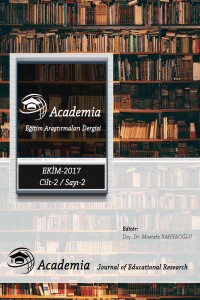Abstract
Son yıllardaki muazzam gelişmeler ile birlikte "nasıl öğreniyoruz" sorusu da büyük ölçüde etkilenmiştir. Bunu sonucunda öğrenene, öğrenmesi gereken bilgi en etkili yollarla sunulması hedeflenmiş ve gelişen mobil teknolojilerde eğitime bütünleşmiştir, bu bütünleşme sayesinde mobil teknolojiler öğrenmek için amaç olmamış araç olarak kullanarak sınıf sistemine entegre edilmiştir. Bu çalışmada, PDA'lar ve cep telefonları gibi öğeleri kullanan personel olarak yeni trend teknolojilerine odaklanacağız ve eğitim materyalleri olarak bunların eğitime nasıl entegre edilebileceğini inceleyeceğiz. Buna ek olarak, mobil ürünler açısından ve bir dersin parçası olarak nasıl kullanılabileceği konusunda iki farklı ülke hakkında bilgi verilecektir. İngiltere'de, mobil öğrenme sağlamak için birçok proje var ve bu projelerin ana amacı, daha etkili öğrenme sağlamaktır. Buna ek olarak, bu ülkenin teknolojik imkânları yönetmek için dikkate değer bir bütçe ayrılmıştır. Türkiye'de zorunlu eğitimde mobil öğrenim sağlamak için büyük bir proje bulunmaktadır, ancak üniversite seviyesinde yeterli sayıda proje bulunmamaktadır.
References
- Allan, R. (2011). Education Update. Can Mobile Devices Transform Education, 53(2), 102-108.
- Campbell, S.W. (2006). Communication Education Perceptions of Mobile Phones in College Classrooms: Ringing, Cheating, and Classroom Policies, 55(3), 280-294.
- Chang,C.Y, Sheu, J.P., Chan, T.W.(2003). Journal of Computer Assisted Learning. Concept and design of Ad Hoc and Mobile classrooms, 19(3), 336-346.
- Cole, H., Stantoni, D. (2003). Personal and Ubiquitous Computing. Designing mobile technologies to support co-present collaboration, 7(6), 365-371.
- Karen, S., Mark, V.H., Annette, K., Darlene, U. (2005). Journal of Research on Technology in Education. Uses and Effects of Mobile Computing Devices in K-8 Classrooms, 38(1), 99-112,
- Keengwe, J., Bhargava, M. (2013). Education and Information Technologies. Mobile learning and integration of mobile technologies in education (pp 1-10).
- Kukulska-Hulme,A., & Traxler,J.(Eds.). (2005). Mobile Learning: A handbook for educators and trainers. London: Routledge
- Liu, T.C., Wang, H.Y., Liang, J.K., Chan, T.W.(2003). Journal of Computer Assisted Learning. Wireless and mobile technologies to enhance teaching and learning, 19(3), 371-382.
- Lonsdale, P., Baber, C., & Sharples, M. (2004). A Context Awareness Architecture for Facilitating Mobile Learning. In J. Attewell & C. Savill-Smith (Eds.), Learning with Mobile Devices: Research and Development (pp. 79-85). London: Learning and Skills Development Agency.
- Motiwalla, F.L.(2007). Computers & Education. Mobile learning: A framework and evaluation, 49(3), 581-596.
- Nicholson, P., Thompson, J.B., Ruohonen, M., Multisilta, J. (Eds.) (2005). E-Training Practices for Professional Organizations: Mobile Technologies and Education (pp. 213-220). Dordrecht: Kluwer Academic Publishers
- Serin, O.(2012).The Turkish Online Journal of Educational Technology. MobileLearning Perceptions of the Prospective TeacherS, 11(3), 222-233.Wentzel, P., Lammeren, R., Molendijk, M., Bruin, S., Alfred, W. (2005, January). Educause Center for Applied Research: Using Mobile Technology to Enhance Students’Educational Experiences. http://net.educause.edu/ir/library/pdf/ers0502/cs/ecs0502.pdf
- Sharples, M. (2002). Disruptive devices: mobile technology for conversational learning. International Journal of Continuing Engineering Education and Life Long Learning, 12(5/6), 504-520.
Details
| Subjects | Studies on Education |
|---|---|
| Journal Section | Articles |
| Authors | |
| Publication Date | October 19, 2017 |
| Submission Date | December 30, 2017 |
| Published in Issue | Year 2017 Volume: 2 Issue: 2 |
Academia Journal of Educational Research
This work is licensed under a Creative Commons Attribution-NonCommercial 4.0 International License.

